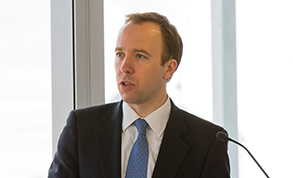Hancock aims for balanced capital spending
Speaking at the NHS Providers annual conference, he said the system would also preserve trust autonomy but ensure capital was used as strategically as possible. Mr Hancock said there would be a single capital sign-off process at national level – a committee that will include the Department of Health and Social Care, NHS England and NHS Improvement.
‘I want the national sign-off to be spectacularly more straightforward. We will be guardians of the national capital expenditure limits, and strategic in allocations of central capital, and encourage planning for the future through the HIP [health infrastructure plan] process. But the bureaucracy around sign-offs will be radically simplified.
‘The system must be fair to everyone: NHS trusts and foundation trusts alike,’ he added.
At a more local level, he said integrated care systems (ICSs) must ensure the local system is making the best use of all assets to bolster the health of the population. He wanted to see providers that believe they can better use assets currently owned by NHS Property Services take over those assets.
NHS regions will take an advisory role, supporting ICSs to deliver their plans and ensuring ICSs work with each other. Regions would also play a role in making the relationship between ICSs and the centre workable.
He backed the long-term plan goal of greater tariff flexibility and the move away from activity-based to population-based payments. Flexibility – through blended payments for emergency care and multi-year tariffs – was already spurring innovation and removing perverse incentives, but the NHS could go much further.
‘Fair, transparent, locally-set prices will make it easier to redesign care across providers, support preventative care models and reduce transaction costs,’ he said.
Mr Hancock (pictured) also spoke about the importance of technology and the proposed legislation to smooth the delivery of the NHS long-term plan. On the latter, he said he was considering the proposals carefully, He threw his weight behind removing the Competition and Markets Authority role in tariff-setting, mergers and licence conditions.
The government would mandate technology standards to ensure systems are interoperable. A minimum set of core digital capabilities was needed, supported by the right level of spending, architecture and standards and innovation culture, he insisted.
Related content
We are excited to bring you a fun packed Eastern Branch Conference in 2025 over three days.
This event is for those that will benefit from an overview of costing in the NHS or those new to costing and will cover why we cost and the processes.